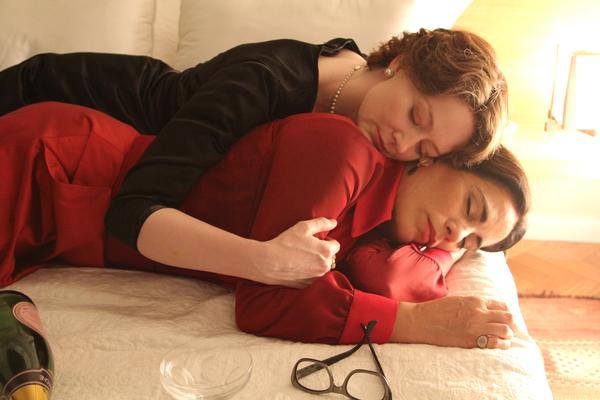Reaching for the Moon tells the story of the explosive love affair between Pulitzer Prize winning poet Elizabeth Bishop (Mirnada Otto) and Brazilian architect Lota de Macedo Soares (Gloria Pires) in 1950s Brazil. The film takes you deep into the price and struggle of creativity, and gives an interesting look back at a woman whose life we in the public know very little about. It is nice to see Miranda Otto on the big screen and she embodies Bishop with ferocious intensity.
Miranda Otto answered some questions (by email) about the film and Elizabeth Bishop.
Women and Hollywood: What drew you to playing Elizabeth Bishop?
Miranda Otto: Her intelligence, her talent, her vision, her ambiguity and her flaws. I read the script and immediately fell in love with both Elizabeth and Lota. It was so interesting to read a script where the main three characters are women. The absence of a central male role created a very different lens that intensified these women instead of diffusing them and I found all three female roles so much more rich and unpredictable than I often read.
WaH: This is an amazing and obsessive love story between two women. How were you able to get that intensity to spark onscreen?
MO: Gloria was fantastic and I think we both turned up passionately committed to this story and these women. They were so different as people that putting them onscreen together created a natural electricity. It was all there in the script and character and our passion to let them live on screen.
WaH: Elizabeth is an extremely important poet in our history yet so few people know enough about her. What do you want people to know about Elizabeth after they finish watching the film?
MO: I’d love people to read her poems.
WaH: What was the biggest challenge in making the film for you?
MO: So many challenges in this role but the one I struggled with the most was playing a woman I deeply admired who was intensely private. Wanting to open her to people but not expose her.
WaH: Elizabeth Bishop was so uncomfortable with her sexuality. Do you think she was a product of her times?
MO: I don’t actually think she was uncomfortable with her sexuality . I think she was very modern in the way she lived her life. She had other long-standing relationships with women prior to and after Lota. Her reticence in the beginning I think is more about the feeling that you could be completely swept away by a woman as powerful as Lota -would she be strong enough to match that- and also that Lota is already in a relationship with her friend. I think there’s always a moment before you fall in love where you stand at the top off the cliff hesitating and sometimes fighting the feeling because you know once you begin its unstoppable.
I think what she was uncomfortable with, was being trapped, or defined by any one thing. She wanted her work to speak for itself. She didn’t even want to be included in Anthology of Women’s Poems as she saw her self as a Poet full stop not a female poet.
WaH: Talk about what it took to show the artistic side of Bishop. Where did you get the inspiration for that?
MO: I read her poems and stories and her correspondence with Robert Lowell and listened to the few recordings of her reading her poetry. I looked at photographs of her handwritten work and notes. I found a fantastic piece online about the many different drafts of One Art-the poem that bookends the film. And Bruno and I imagined what that writing process would be like. A lot of writing is hearing it in your head. Feeling an idea and trying to find and illuminate it. Then speaking it out loud to hear the rhythms. Bruno wanted to make that part of the film as active as possible. To take in the natural world around her and find a sensuality to the process.
WaH: What does the title of the film mean to you?
MO: Reaching for the Moon to me means yearning and striving for something beautiful, elusive and powerful that you can never quite own. You can admire it, be under its spell but you can’t hold it. For Elizabeth, on the one hand it’s about Lota and their love affair and on the other hand its about her poetry and what she wanted to express. The desire for transcendence in love and art.
WaH: What’s next for you?
MO: I’m currently working on the Fox TV Show Rake with Greg Kinnear which is a lot of fun. It premieres January 19th and then that same week I also have the film I Frankenstein opening. I have another film The Homesman, directed by and starring Tommy Lee Jones, due out next year.
Reaching for the Moon opens in limited release today.






